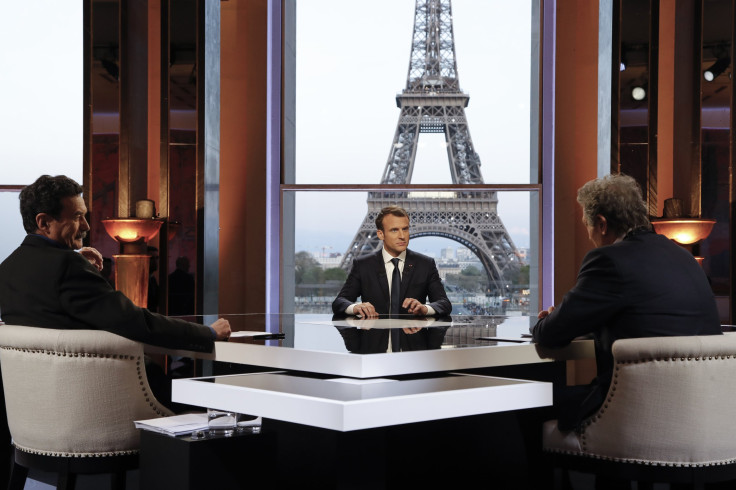Is Emmanuel Macron's 'Bromance' With Trump Guiding US Syria Intervention?

French President Emmanuel Macron said Sunday, that he convinced U.S. President Donald Trump to station troops in Syria for the long term and that the joint strikes, that took place early Saturday, should be limited to chemical weapons facilities.
Speaking in an interview, the French president said: “We also persuaded him that we needed to limit the strikes to chemical weapons [sites] after things got a little carried away over tweets.”
Macron is seemingly one of the more respected world leaders by Donald Trump, with a relationship that France24 referred to as a “bromance.” The other nation involved in the strike was the United Kingdom, and given that the country hasn’t particularly embraced the U.S. president, leading to speculation that the U.S.-U.K. traditional “special relationship” has seen better days, Trump may look to offset that diplomatically by taking a more open stance to France.
“Ten days ago, President Trump wanted to withdraw from Syria. We convinced him to remain,” Macron claimed on French television.
However, in response to these claims the White House, Press Secretary Sarah Sanders, said: “The U.S. mission has not changed — the president has been clear that he wants U.S. forces to come home as quickly as possible. We are determined to completely crush ISIS and create the conditions that will prevent its return. In addition, we expect our regional allies and partners to take greater responsibility both militarily and financially for securing the region,” Fox reported.
The U.S. president took to his favorite means of communicating with the country Sunday and tweeted: “A perfectly executed strike last night. Thank you to France and the United Kingdom for their wisdom and the power of their fine Military. Could not have had a better result. Mission Accomplished!”
Speaking to Fox News, when U.S. ambassador to the UN Nikki Halley was confronted about whether Trump’s claim of “mission accomplished” was premature, she said: “Well, first of all, ‘mission accomplished’ is a military term, and as a military spouse I know that ‘mission accomplished’ means you have one task currently in front of you, and when it’s completed, it’s ‘mission accomplished.’”
“Politically, ‘mission accomplished’ means something broader, and I think that the president was referring in military terms. We of course know that our work in Syria is not done. We know that it is now up to Bashar al-Assad, on whether he’s going to use chemical weapons again. And should he use it again, the president has made it very clear, that the United States is locked and loaded,” she added.
As the French president mandated the actions by the joint force by saying they had “complete international legitimacy to act,” Russian President Vladimir Putin warned Sunday, after speaking on the phone with Iranian leader Hassan Rouhani, “that if such actions committed in violation of the U.N. Charter continue, then it will inevitably lead to chaos in international relations.”
The above comments came after the United States announced it is prepared to add pressure against Russia through economic sanctions should Moscow continue supporting Assad, the accused behind the chemical attack last week.
"We're letting Russia know this is not something that we want to be a part of," Haley told Fox News. "It's not something we're going to tolerate and they've got to make a decision. Right now, they don't have very good friends, and right now, the friends that they do have are causing them harm.”
Macron, in his interview, called the actions “retaliation, not an act of war.”
“We had reached a point where these strikes were necessary to give back the [international] community some credibility,” the French president said.
He also thought Russia was complicit in the attack and said: “Of course they are complicit. They have not used chlorine themselves but they have methodically built the international community’s inability to act through diplomatic channels to stop the use of chemical weapons.”
© Copyright IBTimes 2025. All rights reserved.






















